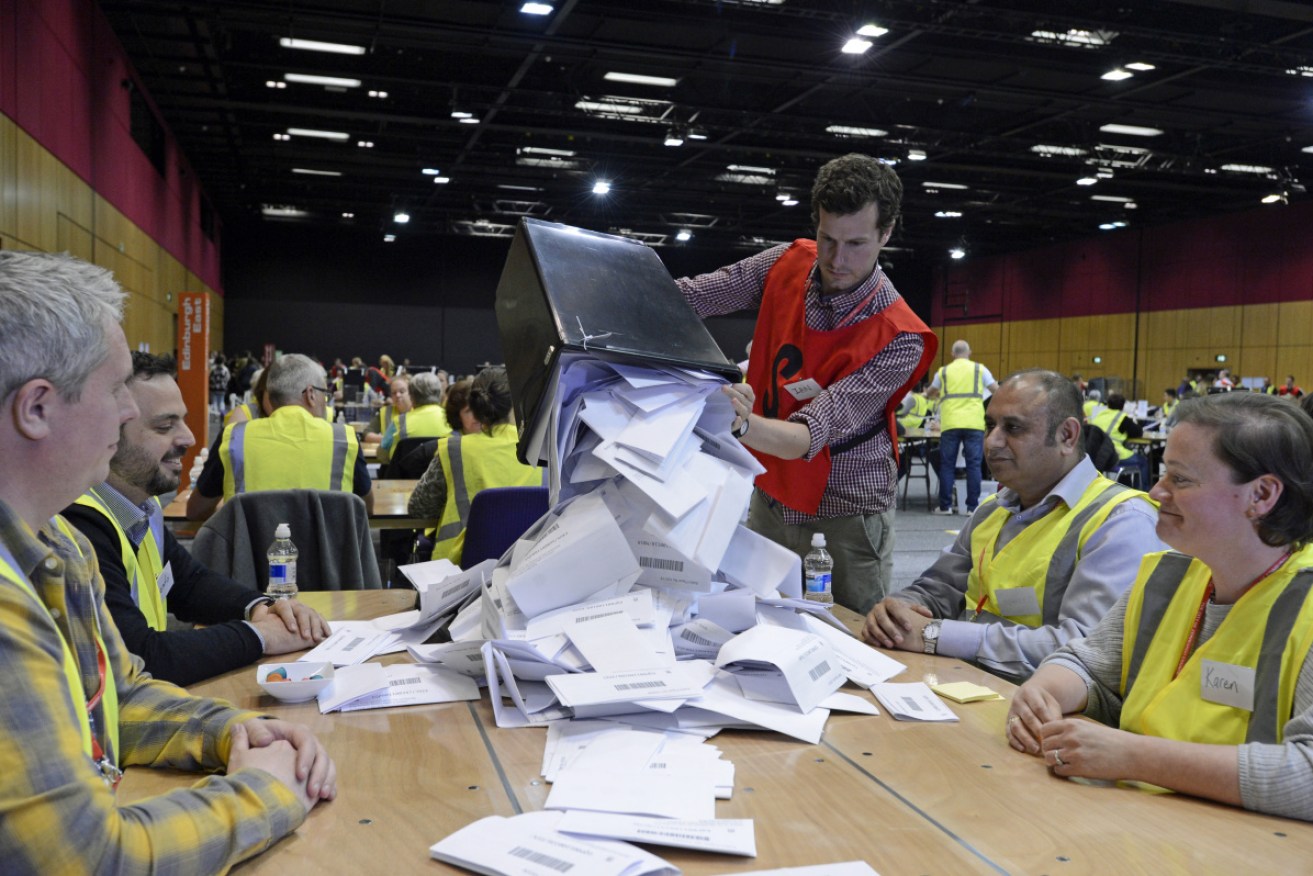Nationalist uprising stalled amid record voting in European Parliamentary elections


Counting of votes for the European election gets under way at the Edinburgh International Conference Centre. Photo: Getty
Parties committed to strengthening the European Union have held on to two-thirds of seats in the EU parliament although far-right and nationalist opponents made strong gains.
Pro-green and liberal parties also experienced a surge in support in the European elections, stalling a rising sense of anti-European nationalism.
Early results show centre-left and centre-right parties are set to lose dozens of seats in the European Parliament which represents 28 member states.
A first official projection of all 751 seats indicates that losses for the pro-EU centre may have been no worse than expected, with the Greens and liberals also gaining at the expense of the centre-right and centre-left.
“The big thing is that the gains for the extremists were not very substantial,” said Guntram Wolff, head of the Bruegel economics think-tank in Brussels.
EU officials were delighted by an increase in turnout to 51 per cent, up eight per cent from 2014 and the first reverse in falling participation since 1979.
At its highest in 20 years, that turnout may muffle talk of a “democratic deficit” undermining the legitimacy of EU lawmaking.
In the UK, Nigel Farage’s Brexit Party was set for a big win, reflecting frustration at the fact Britain is still in the EU, two months after the original Brexit date.
In France, an official in President Emmanuel Macron’s team acknowledged “some disappointment” that, with some 22 per cent, Renaissance had lost first place to Le Pen’s National Rally, which exit polls put on 24 per cent. However, pro-EU parties were still in the majority, with the French Greens coming third.
Added to the dazzling second place of their German counterparts, that lent credibility to expectations of a “green wave” that will influence policy in Brussels in the coming years – promoting controls on industrial polluters of the air, seas and land and tightening terms for EU trade deals.
In Germany, Chancellor Angela Merkel’s conservatives lost seven percentage points from five years ago as the far-right Alternative for Germany gained four points. But the headlines there went to the Greens, who nearly doubled their vote to finish second on 21 per cent, ahead of the Social Democrats.
Elsewhere, the Socialists won the largest share of seats in Spain, while the Salvini-led far-right League became Italy’s largest European representatives, predicted to claim up to 31 per cent of the vote.
The Parliament’s projection put the European People’s Party on 178 seats, ahead of the Socialists and Democrats on 152, with the liberals on 108, up 39 seats, and Greens on 67, up 15. On the far-right, two current parliamentary groups had a combined 108 seats, a 40 per cent gain.
The European Parliament election will usher in weeks and possibly months of hard bargaining over who will run EU institutions. Party spokespeople for the four pro-EU centre parties were quick to talk of plans for a broad coalition.

Early projections from the European elections. The European parliament is made up of 751 seats representing 28 member states. Image: European Union
Nigel Farage’s Brexit Party is set to storm to victory, riding a wave of anger at the failure of Prime Minister Theresa May to take the country out of the European Union, early results show.
The country’s two main parties, Mrs May’s Conservatives and opposition Labour, haemorrhaged support while smaller pro-EU parties did well, with the Liberal Democrats projected to come in second place.
Britain took part in the European Parliament elections because it had delayed the date of its EU exit, but its MEPs will leave the parliament when Brexit occurs.
Mrs May quit on Friday, saying it was a matter of deep regret she had been unable to deliver Brexit and arguing the decision of the 2016 referendum should be honoured.

Nigel Farrage’s Brexit Party is set to storm to victory in the EU elections. Photo: Getty Images
BBC projections put the Conservatives on around 10 to 12 per cent, down from 23 per cent in 2014, likely one of their worst ever results in a nationwide election.
The Brexit Party was in first place and was likely to do better than the UK Independence Party did in 2014, according to BBC projections.
In France, Marine Le Pen’s far-right party edged just ahead of the centrist alliance of President Emmanuel Macron in exit polls as French voters led what pollsters expect to be a nationalist surge in the EU parliament election.
The defeat was narrow – just one seat – but a bitter one for for those who hope the French leader can inspire Europeans to embrace the European Union as an answer rather than part of the problem in the face of what for many is nerve-racking social change.

Marine Le Pen’s National Rally party is on track to beat President Emmanuel Macron. Photo: Getty
Meanwhile Greek Prime Minister Alexis Tsipras has called snap national elections after suffering a heavy defeat from opposition conservatives in European elections.
With an unexpectedly severe pounding at the ballot box for leftist Syriza, Mr Tsipras decided not to continue to a full term, which expires in October.
“I will request immediate declaration of national elections from the President of the Republic,” Mr Tsipras said. A party source said the earliest a vote could take place would be June 30, to allow for preparations.
Results for the European Parliament vote showed Syriza trailing the opposition New Democracy party by about nine points.
Syriza stormed the Greek political scene on an anti-austerity platform six years ago, then suffered a backlash after a third bailout in 2015.
More damagingly, there was a deeply unpopular agreement that resolved a long-running name dispute with North Macedonia.
New Democracy leader Kyriakos Mitsotakis demanded Tsipras resign, saying he had lost the popular mandate.
“The Prime Minister must assume his responsibilities. For the good of the country he must resign and the country should hold national elections, the soonest possible,” Mr Mitsotakis said.
CNN reports that Hungary’s far-right nationalist Prime Minister Viktor Orban has scored a huge win according to provisional results, after his Fidesz party received 52.14% of votes.
That’s more than three times the amount of the second most popular party, the left-wing Democratic Coalition, which received just 16.26%.
In Brussels a “yellow vest” protest march has been taken over by black-hooded demonstrators, with authorities detaining a few hundred people.
The yellow vest demonstration was intended to be against social injustice on the day of European Parliament elections. But it degenerated into disorder, with some protesters pelting buildings and smashing barricades. Police intervened to disperse the violent demonstrators.
A yellow vest protest march turned violent in Brussels with demonstrators pelting buildings and police using pepper spray in confrontations.https://t.co/kVTtcWf24a
— Al Arabiya English (@AlArabiya_Eng) May 26, 2019
Brussels police spokeswoman Ilse Van de Keere said around 350 people were briefly detained but were released later Sunday.
Police on horseback patrolled the historic centre and scuffles broke out in different areas.
The protest came as Belgians voted on Sunday at the regional, federal and European levels, dubbed a “triple election”.
A far-right, anti-immigrant party made huge gains in the northern Flanders region, according to near-complete national election results. The result looks set to complicate a national coalition government.
-AAP








